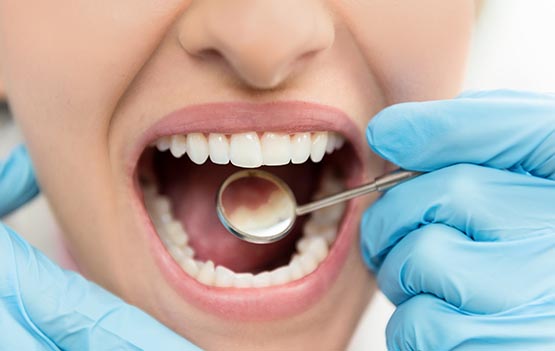

If you have ever had a broken tooth, cracked tooth, or a root canal, then you have likely been told you need a tooth crown, which is a type of cap used to protect damaged teeth. While porcelain veneers only cover the front, visible portion of the teeth, a tooth crown in Gainesville usually covers most, if not all, of the tooth, providing it with support. Depending on the type of crown you received, your crown should last a number of years before requiring repair or replacement. Yet, it is possible for you to experience a lost crown before this time.
A lost dental crown can come loose and fall out before the end of its functional lifespan. If your tooth crown becomes dislodged or falls out, it’s important to know how to handle the situation. Contact a dentist in Gainesville with Van Dyke General and Implant Dentistry to learn more about dental crowns and our available emergency dentistry services. Crowns can come loose for a variety of reasons, and you may not even notice your dental crown has loosened from your tooth until it falls out of your mouth. This can happen as a result of the following. In some cases, a crown is only partially dislodged, while in others, it may come out completely.
Accidents happen and, when they do, your dental crown might crack, chip, become dislodged, and fall out, resulting in a lost tooth crown. The reason a dental crown was initially needed can affect the amount of pain and discomfort you feel when you lose the crown. If the tooth under the crown is severely damaged, or if the root, nerves, or pulp are exposed, the pain may be unbearable as the area can be extremely sensitive. You will likely feel pain from both hot and cold, and the area may become inflamed. Even if you do not feel pain right away, it’s important to have your crown replaced.
Some may feel self-conscious about having a decayed or broken tooth visible. Although you may not think that a cosmetic issue is enough of a reason to have a crown replaced, it’s imperative to protect the now exposed tooth. If you bite down on something hard and then feel a strange, lumpy object on your tongue, its likely that your crown fell out and it is now floating around in your mouth. If this happens, or if any other situation occurs which results in a lost crown, follow these steps from our dentists in Gainesville. For more information about what to do after losing teeth crowns, contact us.
A crown may become dislodged or fall out while you eat. If this happens, try not to swallow it. In many cases, we can reattach a dislodged crown, so it’s better if you can find it and bring it with you to your next dental appointment.
Once you recover the crown (if possible), inspect it as well as the portion of the underlying tooth. By thoroughly examining the area, you can provide your dental team with the information needed to help you get the treatment you need.
Once you have inspected the area, it is time to contact your dentist. In this conversation, you should explain what happened and answer any critical follow-up questions they may have. They will tell you about the next best steps for tooth crown replacement or repair.
If you’re in pain after losing dental crowns, you can take over-the-counter pain medication, such as acetaminophen. If you cannot take pain medication, you may apply natural clove oil to the area using a cotton swab.
If you are able to locate the crown, you might be able to temporarily reattach it to your tooth. First, gently clean the tooth and the area surrounding the tooth as well as inside the crown. Once cleaned, you may reattach it using a dental adhesive available at the pharmacy.
During your appointment with Van Dyke General and Implant Dentistry, your dentist may either recommend a crown repair or crown replacement procedure. The exact steps of your procedure will vary depending on the status of your tooth and lost crown.
If your crown falls out, becomes dislodged, or comes loose, you should try to avoid swallowing it. Should the crown fall out of your mouth or come loose in your mouth, retrieve it, clean it, and hold onto it! Other important steps to take when your crown falls out and while you await your appointment with us include the following.
In some cases, you might have received a same-day crown, which is placed in your tooth on the same day you need it. Most often, however, patients receive temporary crowns until their permanent crown is ready for placement. A temporary crown is a placeholder that fills the area in your tooth where the permanent crown will eventually remain. Patients might have a temporary crown for a number of weeks before their final crown is placed. Temporary crowns are usually placed using temporary dental cement.
As such, you may need to be extra cautious with your temporary crown. Your dentist will likely recommend that you avoid eating hard, chewy, and very sticky foods. Even with caution, however, it is possible for a temporary crown to fall out. If your temporary crown fell out, contact your dentist and ask for instructions regarding what to do until your next appointment. In the meantime, use standard instructions you might use if a permanent crown fell out.
A crown shouldn’t cause discomfort or pain. Nor should it fall out. For some patients, however, their crowns may become compromised and dislodge from the tooth, resulting in a lost crown. It is not always possible to prevent a crown from falling off, particularly if the crown was not properly fitted, if the dental cement used has worn away, or if you develop tooth decay under the crown. However, you can still be proactive about caring for your dental crown in order to reduce the chance of needing a dental crown replacement before it is necessary.
The lifespan of dental crowns typically varies from patient to patient. Generally, however, tooth crowns can last anywhere between 10 years and 30 years. This depends on the condition of the original tooth with the crown, the level of care and maintenance used with the crown, the materials used to make the crown, and how well the crown was fitted at the time it was inserted, among other factors. You can help extend the lifespan of your dental crown by regularly scheduling and attending your dental appointments with us; notifying us of any issues you may experience with your oral health or crown, and practicing proper dental care for top oral health.
Maintain clean teeth and gums and be diligent about brushing and flossing twice each day. Though tooth decay may not necessarily compromise the structural integrity of your crown, it can weaken your tooth underneath. When this occurs, the crown fits improperly and can eventually fall out. Additionally, when flossing around your dental crown, be cautious. Flossing helps to prevent tooth decay and keeps your teeth healthy, but using too much pressure can damage or dislodge your crown. A member of our dental team will provide you with instructions regarding oral hygiene while wearing a tooth crown.
There are a number of different materials used for dental crowns, as well as different types of crown configurations. Metal crowns are most commonly used to crown the back teeth, which withstand the greatest amount of oral pressure. Porcelain crowns are not as durable as metal crowns, though they are still quite resistant to wear. These crowns mimic the look of natural teeth, making them ideal for the front teeth. Crowns made from resin may be cost-effective, though they generally don’t last as long as other types of crowns.
Although crowns are cemented to the surface of your tooth, it is possible to lose a crown while eating or after the crown is knocked loose. A crown may also loosen if the tooth underneath falls victim to decay. No matter the reason your dental crown fell out, our Gainesville dentists with Van Dyke General and Implant Dentistry can quickly and conveniently replace or repair your crown and restore your smile to an optimal level of health.
The dislodging of a crown does not usually require immediate attention. Most patients experience little pain or discomfort when a crown is lost, however, that does not mean you shouldn’t schedule an appointment to have the crown replaced. While the tooth may not be in immediate danger, extended exposure can cause you a great deal of pain and leave the tooth open for the buildup of plaque or further damage.
